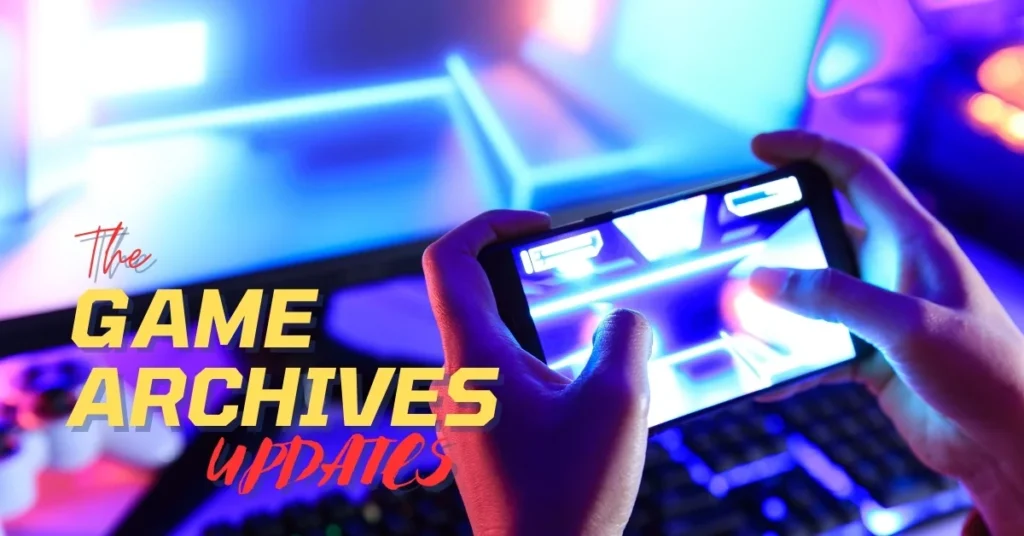
Have you ever wondered what happens to old video games that are no longer available? Many classic and rare games are lost to time, making them impossible to find or play. This is where game archives come in. TheGameArchives Updates are dedicated to preserving video game history, ensuring that old and forgotten games are not lost forever. Through game preservation, these archives keep the legacy of gaming alive for future generations.
In this blog post, we will dive into the latest updates from The Game Archives. We will explore how new technology and community efforts are helping to save these pieces of gaming history. From lost video games being rediscovered to improved emulators making old games playable again, there is a lot to be excited about. Whether you’re a retro gaming fan, a game developer, or just curious about the past, understanding these updates is crucial. Let’s explore how game archiving is shaping the future of gaming.
What Are Game Archives?
Game archives are collections designed to store and preserve video games. They ensure that old, rare, and classic games remain accessible for future generations. These archives can be divided into two main types: digital and physical.
Digital vs. Physical Archives
- Digital Archives: Games are stored as data files, making them accessible on modern devices. This method helps in preserving games that were originally digital or have been converted to digital formats.
- Physical Archives: Original game cartridges, disks, and consoles are preserved. This approach helps maintain the integrity of physical gaming media and hardware.
Types of Game Archives
There are various types of game archives based on their focus and scope:
- Retro Game Archives: Specialize in preserving games from earlier decades. They focus on older console and arcade games.
- Comprehensive Archives: Aim to collect and preserve a wide range of games, from the oldest arcade titles to contemporary digital-only releases.
Role of Community-Driven Projects
Community-driven projects play a significant role in game preservation. Fans and volunteers contribute by finding, restoring, and sharing games. Their efforts ensure that even obscure or forgotten titles are saved and made available.
Importance of Video Game Preservation
Preserving video games is crucial for maintaining our cultural heritage. Just like other forms of media, games are an important part of our culture and history. Without preservation, many unique and historically significant games could be lost forever. Game archives help keep this aspect of our past alive.
New Additions to Game Archives
TheGameArchives Updates have recently added several new games to their collections. These include lost video games that were thought to be gone forever. Rediscovering these rare titles fills important gaps in gaming history. It gives players a chance to experience games that have almost disappeared.
Improvements in Emulation Technology
Emulation technology has seen some significant updates. Emulators allow old games to run on modern computers and devices. Recent improvements have made these emulators more compatible and easier to use. Now, gamers can play more classic games without needing the original consoles.
Community Contributions to Game Preservation
The gaming community plays a huge role in archiving efforts. Fans, volunteers, and enthusiasts often help find and save old games. They contribute time, skills, and resources to keep these archives growing. Without community support, many rare games would never make it into the archives.
How Are Games Selected for Archival?
Not every game automatically gets archived. Games are chosen based on their cultural impact, rarity, and historical value. This helps ensure that the most important and unique titles are preserved for the future.
Challenges in Game Selection
Selecting games for archiving comes with challenges. Some games have missing source codes or lost rights, making them hard to preserve. Licensing issues also create hurdles, as many games cannot be archived without permission.
Role of Game Developers and Publishers
Game developers and publishers play a crucial role in preservation. Their support can help make source codes and original game files available. However, some companies are reluctant, fearing the loss of control over their content.
The Process of Archiving Games
Archiving games is a detailed process that involves several steps. It starts with finding the game, often through old cartridges, disks, or digital files. Next, the data is carefully extracted and preserved to prevent any loss or damage.
Techniques Used in Game Archiving
Different techniques are used to archive games, like ROM dumping and data recovery. ROM dumping involves copying the game data from the original hardware to a digital format. Emulation then helps make the game playable on modern devices without needing the original console.
Tools and Technology for Preservation
Tools like open-source emulators are vital for game preservation. These emulators are regularly updated to improve compatibility with older games. Other tools, like data recovery software, help restore lost or damaged game files.
Case Study: Classic Game Restoration
A classic game restoration often involves recreating missing elements. For example, missing soundtracks or art may need to be rebuilt from scratch. This process requires both technical skills and a deep love for preserving gaming history.
Legal and Ethical Considerations in Game Archiving
Archiving games involves various legal and ethical issues. Copyright laws can make it difficult to preserve and share old games. Without proper permissions, archives might face legal challenges or be forced to remove certain games.
Copyright Issues
Copyright laws protect the rights of game creators and publishers. This means that TheGameArchives Updates must often seek permission to preserve and distribute games. Without these permissions, some games cannot be included in archives.
Ethical Debates
There are ethical debates about preserving and sharing games. Some argue that preserving games is important for cultural heritage, while others worry about the impact on original creators. Balancing these concerns is a key part of the preservation process.
Public Domain and Fair Use
Some games may enter the public domain, making them easier to archive and share. Fair use laws can also allow limited use of copyrighted material for preservation purposes. These legal aspects help determine how games can be accessed and used.
Community Involvement and Contributions
The gaming community is essential to game preservation. Fans and volunteers often help find and save old games. Their contributions make a big difference in keeping game archives updated and complete.
Crowdsourcing Archives
Crowdsourcing involves gathering support and resources from a large group of people. Many game archives rely on crowdsourcing to discover rare games and gather necessary data. This collective effort helps expand and enhance game collections.
Fan Projects
Fan projects play a significant role in preservation. Enthusiasts often work on restoring or translating old games. Their dedication helps ensure that more games are preserved and accessible.
Spotlight on Archivists
Archivists are key figures in the preservation community. They manage and organize game collections, often working with limited resources. Their expertise helps keep game archives running smoothly and efficiently.
Why Updates Matter: The Impact on Gaming Culture
TheGameArchives Updates have a big impact on gaming culture. They bring back lost games and preserve important pieces of gaming history. This helps keep the history of video games alive and accessible.
Reviving Lost Games
Updates in game archives can revive games that were once thought to be lost. This allows new generations to experience classic titles that they may have missed. It also helps maintain the connection between past and present gaming experiences.
Cultural Preservation
Preserving games is crucial for cultural heritage. Just like books and movies, video games are a part of our cultural history. Game archives ensure that these cultural artifacts are not forgotten.
Educational Value
Game archives serve as valuable resources for research and education. They provide insights into the evolution of gaming and technology. Students, historians, and enthusiasts can learn from the preserved games and their history.
How to Access and Use Game Archives
Accessing game archives is straightforward once you know where to look. Many archives are available online and can be explored through various websites. Here’s how you can get started with exploring these valuable collections.
Popular Archives to Explore
Some popular game archives include the Internet Archive and MAME. These archives offer a wide range of old games and emulators. You can search for specific titles or browse through different categories to find what interests you.
Step-by-Step Guide
To access game archives, start by visiting their websites. Look for sections like “Collections” or “Games.” Follow the instructions to download or play the games using available emulators.
Compatibility Tips
Make sure your device meets the requirements for running emulators. Some games may need specific settings to work correctly. Check the archive’s guidelines for tips on ensuring smooth gameplay.
The Future of Game Archiving
The future of game archiving is full of potential and challenges. Technology is advancing rapidly, offering new ways to preserve and experience old games. Understanding these future trends helps us prepare for what’s next in-game preservation.
Technological Advancements
New technologies are making game preservation easier. Innovations like AI and enhanced emulators can improve how we archive and restore games. These advancements promise to make it simpler to preserve even the most complex games.
Challenges Ahead
Despite progress, there are still challenges. Issues like copyright disputes and the need for continuous updates can complicate preservation efforts. Addressing these challenges is crucial for the future of game archiving.
The Role of the Gaming Industry
The gaming industry’s support is vital for preservation. Developers and publishers can help by providing access to original game files and supporting preservation projects. Their involvement ensures that important games are not lost and remain accessible to everyone.
How You Can Get Involved
You can play a role in game preservation. There are several ways to support game archives and help keep gaming history alive. Your involvement can make a significant difference.
Support and Donations
One way to help is by donating to game archives. Many archives rely on financial support to maintain and expand their collections. Your donations can fund important preservation projects and keep the archives running.
Contributing Skills
If you have technical skills, you can contribute to game preservation projects. This includes helping with programming, data recovery, or restoring old games. Your expertise can directly impact the success of these efforts.
Spreading Awareness
You can also support by spreading the word about game preservation. Share information about game archives with friends and on social media. Raising awareness helps gather more support and encourages others to get involved.
Conclusion
Game archiving is essential for preserving the rich history of video games. By storing and restoring old and rare games, archives keep our gaming heritage alive for future generations. Recent updates highlight the progress in technology and community efforts that make this possible.
The future of game archiving is promising, with advancements in technology and increased community involvement driving progress. However, challenges remain, from legal issues to the need for continued support.
Your role in game preservation can be significant, whether through donations, volunteering your skills, or simply raising awareness. Every effort helps ensure that gaming history is not lost but continues to be enjoyed and studied by future generations.
FAQs
What are game archives?
Game archives are collections that preserve old and rare video games, keeping them accessible for future generations through digital or physical means.
How do game archives preserve old games?
They use techniques like ROM dumping and data recovery to create digital versions and improved emulators to make them playable on modern devices.
Why is game preservation important?
It maintains cultural heritage by preventing the loss of historically significant games and allowing future generations to experience gaming history.
How can I contribute to game preservation?
You can help by donating to archives, offering technical skills, or spreading awareness about preservation efforts.
What challenges do game archives face?
Challenges include copyright issues, the need for continuous updates, and difficulties in obtaining original game files.

